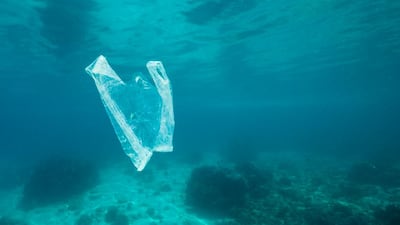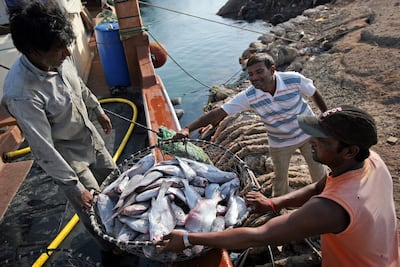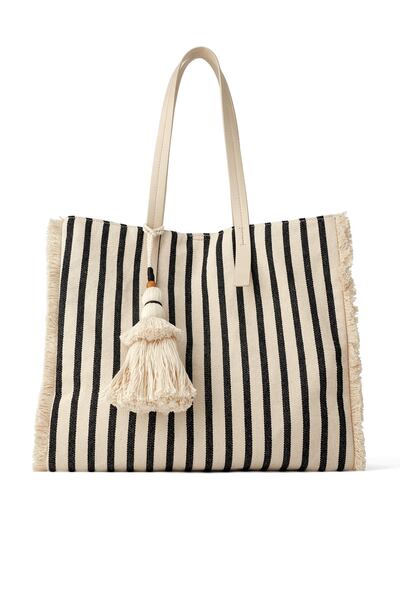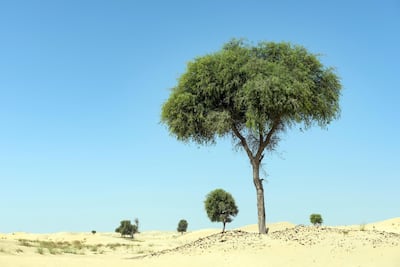Although the issues that the world's oceans are facing sometimes feel very remote, in reality, the majority of people in the UAE live within five kilometres of the shoreline. Meaning that the ecological crisis starting to unfold in our seas and oceans is playing out, quite literally, on our doorsteps.
Water accounts for 71 per cent of our planet's surface, and for centuries has been relentlessly overfished, and used to dump all manner of waste, from chemical to nuclear. Not surprisingly, such unchecked behaviour is beginning to take its toll, and today, the International Union for Conservation of Nature lists 643 fish species as endangered.
Occasions such as World Oceans Day, which falls on Saturday, are about raising awareness of the plight of the sea and finding ways to get involved to better the situation. It is a great reason to embrace new habits that, if scaled up to just 1 per cent of the global population, will have an enormous impact. Here are 10 easy ways in which we can all help change the world.
Ditch single-use plastic
According to the United Nations Environment Programme, an estimated eight million tonnes of the stuff ends up in the sea every year. Much of that is discarded fishing equipment, but a sizeable proportion of the rest is single-use plastic. That water bottle we unthinkingly grab or the carrier bag we transport our lunch in are used on average for just 12 minutes, yet will be around for the next five centuries. The UNEP also states that only 9 per cent of plastic is ever recycled, with the rest ending up in landfill or finding its way into the oceans. A research by Euromonitor International found that across the world, humans purchase one million plastic bottles a minute. In the UAE, the simple act of replacing yours with a reusable version (that can be washed and refilled time and time again) will save hundreds of bottles per person, per year. Multiply that by the country's 9.4 million people, and suddenly we are making a huge difference …
Turn your AC thermostat up
The optimum temperature, suggested by Dewa, for the air conditioning in our homes is 24°C. Setting the thermostat any lower will not only hike up the bill at the end of the month, but also result in more carbon dioxide being created to meet that extra energy demand. The sea is the greatest air purifier on the planet, absorbing 26 per cent of all the CO2 in the atmosphere. We have spent the past 200 years burning coal, oil and gas, destroying forests and belching poisonous fumes into the air, which the oceans have tried to clean. With ever-rising levels of CO2, though, the oceans can no longer keep pace. More CO2 means warmer seas, and warmer seas mean less oxygen and, in turn, less supported ocean life. Ocean plants produce 85 per cent of the oxygen we breathe, so even a small drop in the number of sea plants spells disaster. So, the next time you reach to turn your air conditioning down, ask yourself: what's more important: a cool breeze or having enough oxygen?
Leave the shells be
Who doesn't love seashells? The delicate colours and intricate construction make them infinitely beautiful, while sand dollars, sea anemones and starfish all look lovely in our bathrooms. Yet if every person in the UAE took home just one shell, the beaches would soon be stripped bare. Not only would this result in barren sand, but it would also hinder an important cycle. Empty shells make homes for marine mollusks, sea urchins, crabs and other ever-smaller creatures, and when a shell eventually breaks down, it releases precious calcium carbonate back into the water, allowing new shells to form. Take away all the shells, and that grinds to a halt, so do your children a favour and leave the shells where they belong.
Stop eating hammour
This is a tricky one because the hammour (or grouper) is a much-cherished regional delicacy. However, the Environment Agency Abu Dhabi has also declared it to be endangered. Currently fished at three times the sustainable level, the hammour has seen its numbers decline by 85 per cent, while other species such as the painted sweetlips (or farsh in Arabic) has been reduced to just 7 per cent of adult numbers. Creatures in our waters are twice as pressured as the world average, and whole species face being wiped out, threatening a unique ecosystem. While we enjoy immersing ourselves in local culture, the hammour faces a very real threat of being eaten into extinction, so help preserve the unique regional heritage for the next generation and leave it off your plate.
Buy a bamboo toothbrush
What does teeth brushing have to do with the ocean? Well, that depends where your old plastic toothbrush spends the next 500 years decomposing. If, like all the other tonnes of plastics, it ends up in the sea, perhaps it will be part of the 1.6 million square miles of rotating trash that is the Great Pacific garbage patch. Or maybe it will join the one million plastic flip-flops that recently washed up on Cocos Island. The easy solution is to make sure your next toothbrush is made of bamboo. A fast-growing plant (some species can grow more than 90 centimetres a day), this really is sustainable and when finished with can be composted. Even if just dropped in the garden, bamboo will safely rot away to nothing in a few years.
Carry a fabric tote bag
This is not so much a sartorial direction as a practical one. The UAE is addicted to plastic carrier bags, and we have all witnessed things getting double and sometimes triple-bagged in supermarkets. However, one fabric (read: washable) shopper will replace the estimated 1,500 bags we each consume a year. The energy needed to make 12 plastic bags is the same needed to drive a car for 1.6 kilometres. So one fabric bag over one year will save the same amount of energy as driving from Abu Dhabi to Dubai and back, 17 times. Once in the sea, plastic bags entomb fish and sea birds, and are mistaken for jellyfish and eaten by critically endangered turtles, or get swallowed by whales. They snag on coral reefs and sink to the sea floor; when Victor Vescovo broke the world record for the deepest solo dive in May, venturing to the depths of the Marina Trench in the Pacific Ocean, he found plastic. So just buy a reusable cloth bag, already.
Cut down on the chemicals
Washing-up liquid for the plates, a disinfecting spray for the kitchen and another for the bathroom, and bleach for the toilet and drains. Sound familiar? Unwittingly, we are unleashing a toxic sludge of chemicals into the water supply. Not all chemicals break down during sewage treatment, so when the water is pumped back into the ocean, the chemical residue does, too, including detergents, phosphates, chlorine and ammonia. Detergents break down the protective mucus layer on fish, leaving them susceptible to bacteria, while chlorine and phosphates form dioxins linked to mutation and sterility in fish. All are highly toxic (chlorine was used as a poisonous gas in the First World War), so if the label says "danger" or "long-term harm to aquatic life", please take heed. Good old elbow grease and baking soda will remove most household grime, while the unmentionables can be taken care of with eco-friendly products that clean properly without costing the earth.
Plant a ghaf tree
The harsh environment of the Middle East has produced an astonishingly hardy tree – the ghaf. The official symbol of the Year of Tolerance, this indigenous tree can withstand an environment that kills almost every other plant. Familiar to anyone who has ventured into the desert, this smallish tree, with tiny, olive green leaves, can weather drought by sending its roots more than 30 metres down to the water table. They help bind the sand to stop desertification, and its branches provide precious shade. Camels and goats feed on its leaves, while its bark can be ground into flour in times of real need. In short, it is a remarkable species, and its unique adaptation to this climate means that, unlike imported trees, the ghaf does not need water to be pumped from the sea and desalinated for it to survive. If you only plant one tree this year, make it a ghaf.
Pick up rubbish
How many of you have arrived at a beach, all set for a lovely day, only to find it littered with food wrappers, barbecue sets and glass bottles, thoughtlessly left by a previous visitor? Despite the small army employed to clean the UAE's beaches, perhaps a new mentality is in order – rather than being an idle spectator, get involved in the clean-up process. The easiest way is to pick up what you encounter instead of stepping over it. Or join a beach clean-up day, which several organisations around the country run in the cooler months, and which make for a sociable and social-minded morning out. Divers can do the same, and help remove some of the plastic and detritus clogging wrecks and dive sites. Although it may seem unpalatable at first to pick up someone else's rubbish, the sense of community it will instil is priceless.
Use an ashtray, not the beach
We have all witnessed a smoker aimlessly grind a cigarette butt into the sand. No harm done, right? Wrong. One study of European beaches estimated that up to one third of all litter was cigarette butts, while 3.2 million cigarette ends are cleaned off beaches and waterways every year. With an estimated one billion smokers worldwide, it is safe to assume this figure represents just a fraction of the actual number of discarded sticks out there. Each cigarette butt takes 10 years to decompose, so discarding yours on a beach – where tides come in and out every day – means many will wash into the sea, in the same waters where you swim. Avoid this by simply using a portable ashtray or taking them home with you.





